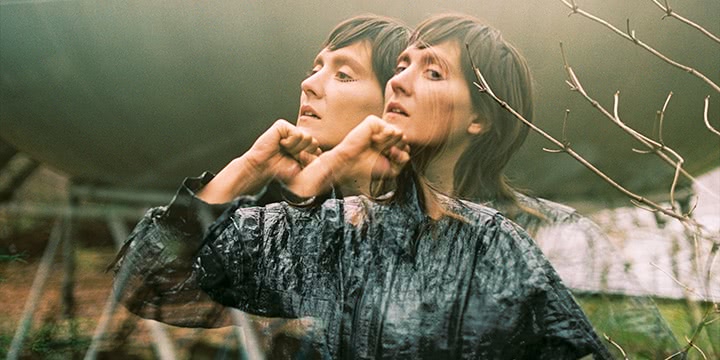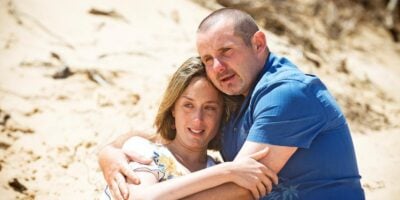We seem to be surrounded by Welsh accents these days.
Of course, in reality there have only been a half-dozen or so on the mainstream music scene lately, but any voice that strikes you as distinct from the norm is destined to leave an impression; it will arrest you from your reverie, shake you back to attention. The haunting Cate Le Bon doesn’t try to hide the roots of her accent in song, as many artists seem strangely compelled to do (a trend that is happily fading here at home). But then, as her fourth album Crab Day scuttles across the shores, Le Bon sees little point in trying to be anything other than herself.
“To me, I think the only goal you should have in music is that no matter what you create, it should be authentic. I don’t understand why you’d try and hide anything – your accent or any other part of you. I mean, this record, to me, it was written in a short amount of time and recorded in a short amount of time. The title is kind of an ode to the absurdity of this age that we live in, how nobody seems to have time and everything is complicated nonsense. So living in that seems absurd, but comes with great fear as well. There’s playfulness, but also dissonance. We played the songs live, and then I did a lot of the overdubs, and I think it’s a pretty… yeah. It’s very much an album.”
Though this may seem itself a perplexing statement – the album is, indeed, an album – I suspect Le Bon is not deliberately trying to be obtuse or enigmatic. Our conversation is interesting and at times revealing, in large part from her tendency to not rehearse responses and instead talk entirely off the cuff (as the best interviews almost always are). But as a result, her remarkably softly spoken answers can be somewhat elliptical, and are studded with many long pauses and half-formed sentences.
“I mean, I’m… Of course it’s wonderful talking to people around the world, and you can be asked very interesting questions that make you think about things that have maybe never crossed your mind. But I don’t think what people write about you, what they say about you, is something that should determine or influence what you do next.
“There are a lot of great journalists out there, writing about music and having great interviews with artists, that are able to extract something that their fans would find really enjoyable to be party to. I think in this modern day of social media, everyone is so willing to share and have their experiences validated. To me, it’s important to retain as much as you can, because once you give something away, it’s gone. I don’t see the harm in creating your own world. You’ll likely have things written about you that are supposedly meant to be true that come as a surprise. You might as well be the first to go there.”
It’s an inspiring sentiment, but few out there truly embrace the potential for self-mythologising. Le Bon is herself a musician of disparate shores, and seems adept at evolving into whatever new environment presents itself. Though born in Wales, she now calls Los Angeles home (she sings in both Welsh and English), and the inspirations she has found on the West Coast have clearly had a profound impact on not only her musical development, but the cultivation of a whole new lifestyle.
“Well, to begin it was just a change of scenery. I’d been living in Wales a long time, and came out here to record a record and it seemed, well, the perfect opportunity to get something new going. I didn’t have any expectations, it wasn’t a frame for anything. When you’re a musician, and maybe not earning that much money, there’s a quality of life up here that’s sustainable. To me, that was the reason predominantly for moving here. I wanted that new scenery and a different quality of life, with a low wage,” she softly laughs. “And I was lucky to fall into a group of wonderful musicians who I’ve worked with ever since.”
In terms of stumbling upon a ragtag crew of musicians, Le Bon was blessed with a rather enviable dose of luck: Josh Klinghoffer of Red Hot Chili Peppers fame, Warpaint drummer Stella Mozgawa, and White Fence’s Tim Presley, with whom she collabored as Drinks.
“You know, I think the thing that inspired me the most on Crab Day was working with Tim and [having] no expectations,” she says. “We didn’t know what we were doing, really, other than deciding to make a record together. It was really thrilling. It made me question why I had expectations when I was making my own music – which I know leads to complete mismanagement on my own part – when actually, the best thing you can do is close the door and employ complete abandon.
“I think this record is then influenced by any music or literature whose attitudes have left an impact. And you know, it’s also growing older, and a knee-jerk reaction to a lot of, I think, beige that’s being prattled these days. We’re always completely bombarded with mediocrity, so I wanted to have something more uninhibited on this record. To keep that knee-jerk reaction.”
[Cate Le Bon photo by Ivana Kličković]
Cate Le Bon‘s Crab Day out now through Caroline.



































